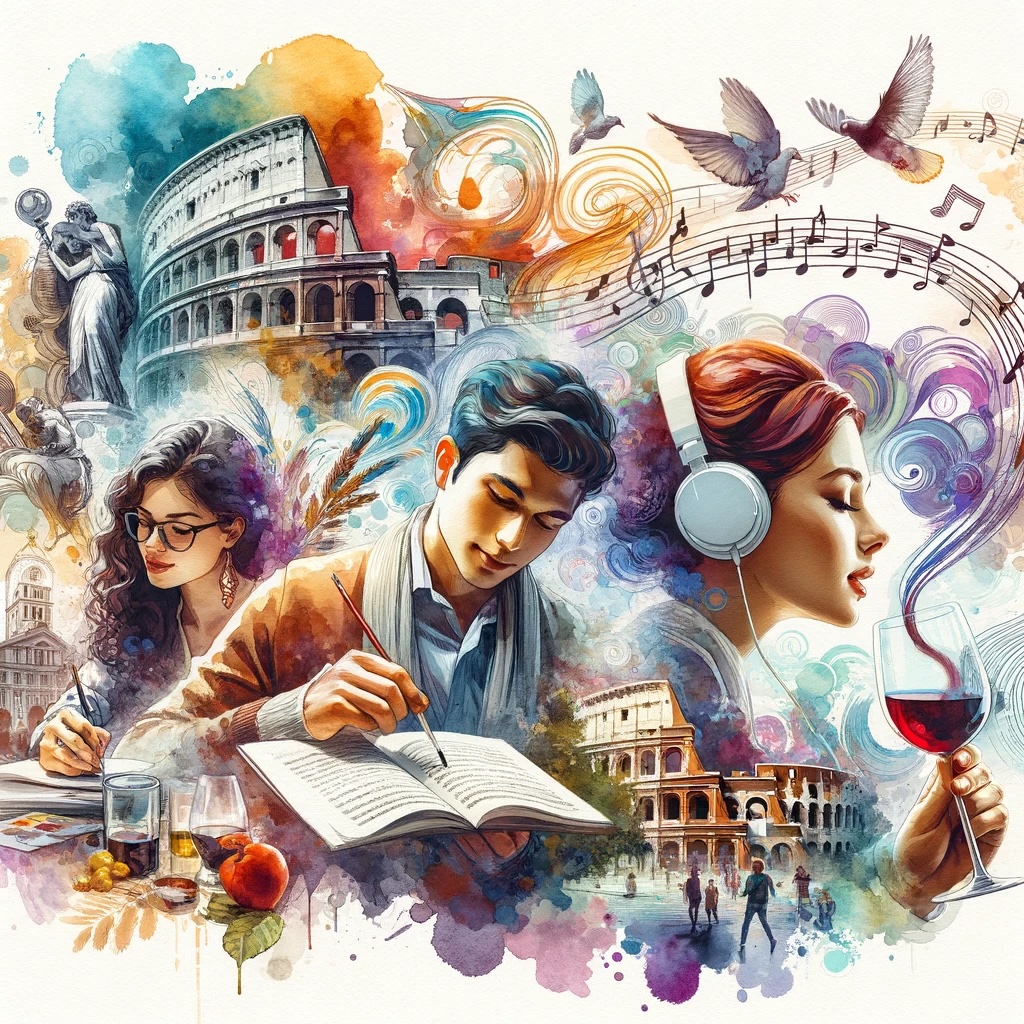Learning a new language is like discovering a new aspect of life. Incorporating Italian into your daily routine and hobbies can make the learning process natural and enjoyable. Here’s how you can add un po‘ di italiano (a little bit of Italian) to your everyday life.
La Mattina (The Morning)
Start your day with a „Buongiorno“ (Good morning) to your family or your reflection in the mirror. Practice your Italian while making il caffè (the coffee) or choosing your vestiti (clothes) for the day. You could even listen to an Italian podcast while you’re having la colazione (breakfast).
Al Lavoro (At Work)
Even if you’re not in Italy, you might find Italian-speaking colleagues or clients. Use simple greetings or phrases such as „Come posso aiutarti oggi?“ (How can I help you today?). Take notes or set reminders in Italian to keep the language at the forefront of your mind.
Il Tempo Libero (Free Time)
Incorporate hobbies like reading by picking up un libro (a book) in Italian. If you love music, listen to canzoni italiane (Italian songs) to improve your listening skills. For the more active moments, find instructions for your wing foil or windsurfing gear in Italian to combine your passion for water sports with language learning.
La Sera (The Evening)
Discuss your day with friends or family in Italian. Use phrases like „Oggi ho imparato…“ (Today I learned…) or „Stasera voglio rilassarmi e leggere un po‘.“ (Tonight I want to relax and read a bit.)
Conclusion
Every aspetto della vita quotidiana (aspect of daily life) offers an opportunity to practice Italian. Through consistent practice, the language will not only be un hobby (a hobby) but a part of your vita (life).
| n Word | IPA Pronunciation | English Translation |
|---|---|---|
| Ciao | /ˈtʃa.o/ | Hello/Goodbye |
| Amore | /aˈmo.re/ | Love |
| Felicità | /feliˈtʃi.ta/ | Happiness |
| Libro | /ˈli.bro/ | Book |
| Caffè | /kafˈfɛ/ | Coffee |
| Acqua | /ˈak.kwa/ | Water |
| Sole | /ˈso.le/ | Sun |
| Luna | /ˈlu.na/ | Moon |
| Amico | /aˈmi.ko/ | Friend |
| Casa | /ˈka.sa/ | House |
| Famiglia | /faˈmiʎ.ʎa/ | Family |
| Cibo | /ˈtʃi.bo/ | Food |
| Scuola | /ˈskwo.la/ | School |
| Lavoro | /laˈvo.ro/ | Work |
| Macchina | /makˈki.na/ | Car |
| Strada | /ˈstra.da/ | Street |
| Tempo | /ˈtem.po/ | Time |
| Città | /tʃitˈta/ | City |
| Musica | /ˈmu.zi.ka/ | Music |
| Mare | /ˈma.re/ | Sea |
| Sport | /ˈspɔrt/ | Sport |
| Stazione | /staˈt͡sjo.ne/ | Station |
| Aereo | /ˈa.e.ro/ | Airplane |
| Bicicletta | /bi.tʃiˈklet.ta/ | Bicycle |
| Albero | /ˈal.be.ro/ | Tree |
| Fiore | /ˈfjo.re/ | Flower |
| Gatto | /ˈɡat.to/ | Cat |
| Cane | /ˈka.ne/ | Dog |
| Libreria | /liˈbre.ri.a/ | Bookstore/Library |
| Straniero | /straˈnjɛ.ro/ | Foreigner |
Dialogue 1: At a Café (Caffè, Acqua, Amico)
- Marco: Ciao, posso avere un caffè e un bicchiere d’acqua, per favore?
- (Hello, may I have a coffee and a glass of water, please?)
- Barista: Certo, desideri altro?
- (Sure, would you like anything else?)
- Marco: No, grazie. Sto aspettando un amico.
- (No, thank you. I’m waiting for a friend.)
Dialogue 2: On a Sunny Day (Sole, Mare, Libro)
- Giulia: Che bel sole oggi! Vuoi andare al mare?
- (What beautiful sun today! Do you want to go to the sea?)
- Luca: Mi piacerebbe, ma ho portato solo un libro per rilassarmi al parco.
- (I would like to, but I’ve only brought a book to relax in the park.)
Dialogue 3: Making Plans (Tempo, Città, Bicicletta)
- Sara: Hai tempo questo weekend per visitare la città?
- (Do you have time this weekend to visit the city?)
- Elena: Sì, possiamo noleggiare delle biciclette e fare un tour.
- (Yes, we can rent bicycles and take a tour.)
Dialogue 4: Getting to Know Someone (Straniero, Lavoro, Musica)
- Alessandro: Scusa, sei straniero, vero? Da dove vieni?
- (Excuse me, you’re a foreigner, right? Where are you from?)
- Tom: Sì, vengo dagli Stati Uniti. Sono qui per lavoro, ma amo la musica italiana!
- (Yes, I’m from the United States. I’m here for work, but I love Italian music!)
Dialogue 5: At the Pet Shop (Gatto, Cane, Famiglia)
- Claudia: Sto cercando un animale domestico per la mia famiglia. Preferisci gatto o cane?
- (I’m looking for a pet for my family. Do you prefer a cat or a dog?)
- Venditore: I gatti sono più indipendenti, ma un cane può essere un ottimo compagno per i bambini.
- (Cats are more independent, but a dog can be a great companion for children.)
Story A1: A Day in the City (Città, Sole, Macchina, Strada, Caffè)

Una mattina, Mario decide di esplorare la città. Il sole splende alto nel cielo e la città è piena di vita. Lascia la sua macchina nel parcheggio e inizia a camminare per la strada. Vede un piccolo caffè accogliente e decide di fermarsi.
„Un caffè per favore,“ dice al barista.
Mentre beve il suo caffè, guarda fuori dalla finestra e pensa a tutte le avventure che lo aspettano in città.
Translation:
One morning, Mario decides to explore the city. The sun is shining high in the sky, and the city is full of life. He leaves his car in the parking lot and starts walking down the street. He sees a small, cozy café and decides to stop.
„A coffee, please,“ he says to the barista.
As he drinks his coffee, he looks out the window and thinks about all the adventures awaiting him in the city.
Story A2: A New Friend (Amico, Libro, Parco, Gatto, Felicità)

Sofia è nel parco a leggere il suo libro preferito quando un piccolo gatto si avvicina. Il gatto si siede accanto a lei e inizia a fare le fusa.
„Ciao, amico,“ dice Sofia, sorridendo. „Come ti chiami?“
Decide di chiamare il gatto Felicità perché ogni volta che è con lui si sente felice. Da quel giorno, Sofia e Felicità diventano grandi amici e trascorrono molti pomeriggi insieme al parco.
Translation:
Sofia is in the park reading her favorite book when a little cat approaches. The cat sits next to her and begins to purr.
„Hello, friend,“ Sofia says, smiling. „What’s your name?“
She decides to call the cat Felicità because every time she is with him, she feels happy. From that day on, Sofia and Felicità become great friends and spend many afternoons together in the park.
